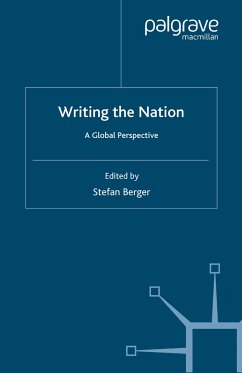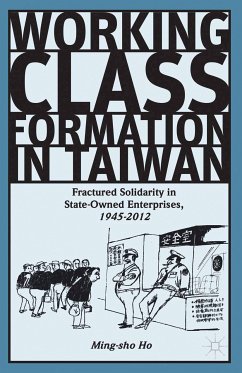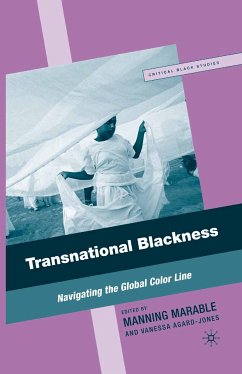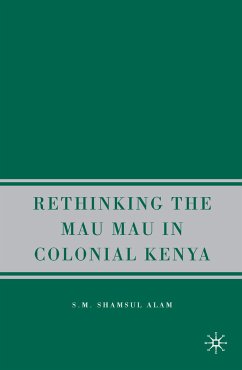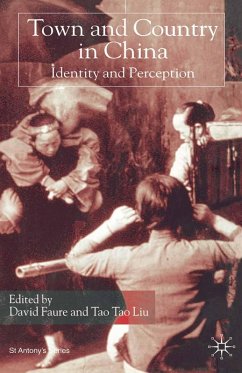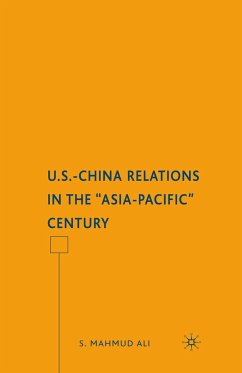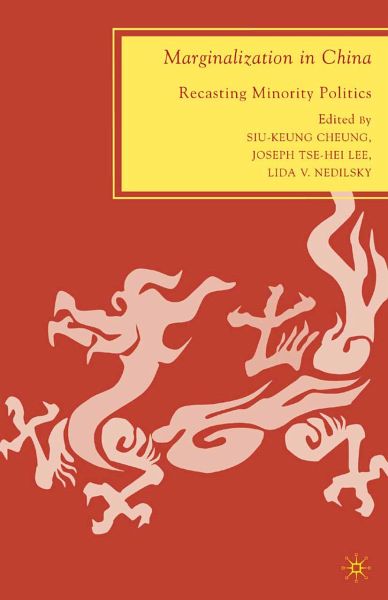
Marginalization in China (eBook, PDF)
Recasting Minority Politics
Redaktion: Cheung, S.

PAYBACK Punkte
20 °P sammeln!






Bringing together historians, sociologists, and political scientists, this volume documents persistent prejudices against consistently marginal groups in China, and the moral claims they have mustered in response.
Dieser Download kann aus rechtlichen Gründen nur mit Rechnungsadresse in A, B, BG, CY, CZ, D, DK, EW, E, FIN, F, GR, HR, H, IRL, I, LT, L, LR, M, NL, PL, P, R, S, SLO, SK ausgeliefert werden.
Joseph Tse-Hei is a professor of History at Pace University.
Produktdetails
- Verlag: Palgrave Macmillan US
- Seitenzahl: 263
- Erscheinungstermin: 22. Juni 2009
- Englisch
- ISBN-13: 9780230622418
- Artikelnr.: 46752523
"Marginalization in China: Recasting Minority Politics presents an impressively broad range of topics related to minority politics in China. Bringing together the 'interest-bearing' and the 'identity forming' notions of minority, the book provides a diverse conceptualization of 'minority' in historic and present-day China."
Journal of Chinese Political Science
"The volume's. . . contributors have succeeded in broadening our notion of 'minority' in China, and they provide insightful research that deserves the attention of scholars of gender and students of China's new class structure."
Ann Maxwell Hill, The Journal of Asian Studies
"The term 'minority'. . . is understood to include any group that is
Journal of Chinese Political Science
"The volume's. . . contributors have succeeded in broadening our notion of 'minority' in China, and they provide insightful research that deserves the attention of scholars of gender and students of China's new class structure."
Ann Maxwell Hill, The Journal of Asian Studies
"The term 'minority'. . . is understood to include any group that is
Mehr anzeigen
numerically or socially lesser than the groups conceived as majorities. . . This new emphasis is welcome and timely. . . Editors and authors have certainly made a very good contribution to the scholarship on their subject."
Colin Mackerras, The China Journal
"Under China's regime of graded citizenship, 'minorities' are variously defined by ethnicity, class, gender and geography. Such state-imposed labels and their marginalizing effects are being vigorously challenged by minority strategies for recognition and rights. The authors of Marginalization in China make a compelling case that the struggles of minorities are at the forefront of an emerging Chinese civil society." - Aihwa Ong, Social Cultural Anthropology, Universityof California, Berkeley
"This book has a diversity of topics and supplies rich detail on a variety of groups in Chinese society. That is what makes it unique." - Merle Goldman, Professor Emerita of History, Boston University and Research Associate, Fairbank Center, Harvard University
"Like every major society in the post-Cold War era, China struggles to find national unity in the midst of ethnic, religious, and regional diversity. This timely new book gives us a fresh look at these struggles, and new consideration of the political, social, and moral challenges they pose.It is especially valuable for providing a historical context for present-day challenges." - Richard Madsen, Distinguished Professor of Sociology and China Studies, University of California, San Diego
"Marginalization in China prompts readers to rethink many central issues: how minority groups refashion state-imposed labels; how nation building is shaped by the contention between state structures and indigenous agencies; and how identity formation and interest representation are negotiated along conflicting class, gender, religious, and ethnic lines. This is a rich and thought-provoking book that should be read closely and one that deserves a wide audience." - Tak-Wing Ngo, Leiden University, The Netherlands
"What makes this volume innovative is its rather broad conceptualization of 'minority.' This is one of the first English language volumes to provide a wider analytical gaze at the politics of social marginalization, making an important contribution to the academic discourse on multiculturalism." - James Leibold, Politics and Asian Studies, La Trobe University, Australia
Colin Mackerras, The China Journal
"Under China's regime of graded citizenship, 'minorities' are variously defined by ethnicity, class, gender and geography. Such state-imposed labels and their marginalizing effects are being vigorously challenged by minority strategies for recognition and rights. The authors of Marginalization in China make a compelling case that the struggles of minorities are at the forefront of an emerging Chinese civil society." - Aihwa Ong, Social Cultural Anthropology, Universityof California, Berkeley
"This book has a diversity of topics and supplies rich detail on a variety of groups in Chinese society. That is what makes it unique." - Merle Goldman, Professor Emerita of History, Boston University and Research Associate, Fairbank Center, Harvard University
"Like every major society in the post-Cold War era, China struggles to find national unity in the midst of ethnic, religious, and regional diversity. This timely new book gives us a fresh look at these struggles, and new consideration of the political, social, and moral challenges they pose.It is especially valuable for providing a historical context for present-day challenges." - Richard Madsen, Distinguished Professor of Sociology and China Studies, University of California, San Diego
"Marginalization in China prompts readers to rethink many central issues: how minority groups refashion state-imposed labels; how nation building is shaped by the contention between state structures and indigenous agencies; and how identity formation and interest representation are negotiated along conflicting class, gender, religious, and ethnic lines. This is a rich and thought-provoking book that should be read closely and one that deserves a wide audience." - Tak-Wing Ngo, Leiden University, The Netherlands
"What makes this volume innovative is its rather broad conceptualization of 'minority.' This is one of the first English language volumes to provide a wider analytical gaze at the politics of social marginalization, making an important contribution to the academic discourse on multiculturalism." - James Leibold, Politics and Asian Studies, La Trobe University, Australia
Schließen
Für dieses Produkt wurde noch keine Bewertung abgegeben. Wir würden uns sehr freuen, wenn du die erste Bewertung schreibst!
Eine Bewertung schreiben
Eine Bewertung schreiben
Andere Kunden interessierten sich für


